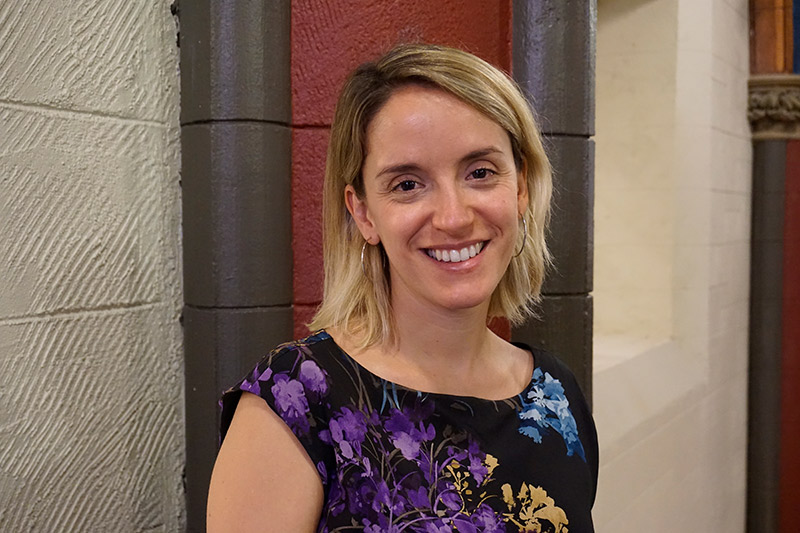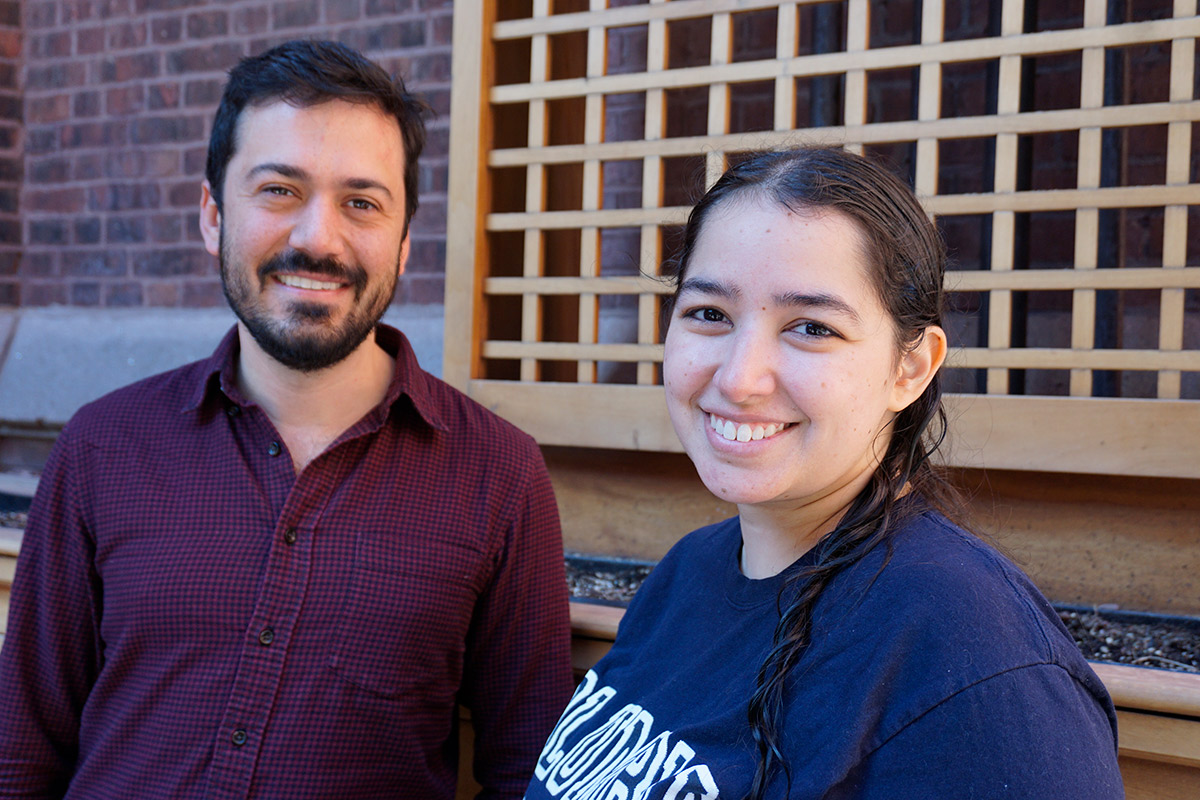Brazil, the world’s ninth-largest economy, has 38 million public school students, reflecting a wide range of cultures and languages. With academic achievement significantly trailing the averages of countries that belong to the Organization for Economic Cooperation and Development, the Brazilian government has made education a national priority and placed special emphasis on bolstering science and the teaching of English.
The Lemann Foundation, a family foundation established by the Brazilian-Swiss entrepreneur Jorge Paulo Lemann in 2002, has been a key player in that effort. The Foundation works to ensure that all Brazilian children have quality public education and to develop a network of talented people who are dedicated to tackling Brazil’s most challenging social problems. The ultimate goal: to advance Brazil by helping Brazilians unlock their full potential.

MUTUAL EXCHANGE Camila Pereira, the Lemann Foundation's Director of Education, says the Foundation‘s partners share their knowledge but learn form Brazil’s experiences as well.
Since 2014, TC has hosted 14 Lemann Fellows – Brazilian students who come to the College to further their research and knowledge, hone their skills, earn master’s degrees and return home to work on Brazil’s social challenges. With a generous gift this past summer, however, the Lemann Foundation significantly broadened that relationship.
“TC is among the best education schools in the world, and we realized that there were many more opportunities for collaboration,” says Camila Pereira, the Lemann Foundation’s Director of Education.
[Read an interview with Pereira about Brazil’s educational challenges, and how TC is helping the Lemann Foundation shape strategies for meeting them.]
The Foundation’s recent gift is funding two major research efforts in Brazil led by TC faculty members.
One is a five-year study of the National Common Curricular Base (BNCC), the comprehensive overhaul of learning standards in Brazilian primary and middle school grades. The study is led by the TC arm of the Consortium for Policy Research in Education (CPRE), founded by TC President Emerita Susan Fuhrman and led by Douglas Ready, Associate Professor of Education & Public Policy.
In addition to scrutinizing the design and implementation of BNCC benchmarks, the study will analyze the BNCC influence on classroom learning, teacher preparation and policy application at the state, district and school level.
“We’re starting by understanding standards which have been several years in the making,” says Ready, a former middle school teacher.
The project began last summer with initial interviews and will ultimately include input from a broad range of stakeholders, including the Brazilian Minister of Education and Culture, state and local policy-makers, non-governmental organizations, classroom teachers and students.
“Given the scale of our system, we definitely have issues of building capacity in the entire workforce,” Pereira says. “But we also have highly qualified people who are doing amazing things that can be replicated.”
An interview with Camila Pereira, Director of Education for The Lemann Foundation
How do you describe the Lemann Foundation to people in the United States?
We are a family foundation rooted in a singular purpose: to advance Brazil. In order to do that, we invest in the country’s talent and find ways to enable Brazilians to reach their full potential. We focus on helping Brazil promote large-scale systemic change in public education and also focus on leadership development, where we support change makers and social leaders who are dedicating their lives to positively impacting Brazil.
How tough is that challenge?
Well, this is Brazil. With 38 million public school students, 2.2 million teachers and almost 200,000 schools, it’s a large-scale challenge. It’s different from – let’s say – Finland or Singapore, who have much smaller student bodies.
That's why our strategy is to act as enablers; we’re empowering people on-the-ground – whether they’re teachers or local community organizers – to share what they know. And we bring ourselves inside of the education system by engaging with teachers and school leaders all across Brazil to ensure that change comes from the inside out.
Despite the challenges, though, we are seeing results. One of the achievements we are most proud of is our role in supporting the development of Brazil’s first-ever National Learning Standards document.
Why partner with American universities?
We believe there’s a lot of knowledge that exists out in the world that needs to be amplified. We know that there are institutions with experienced and expert faculty and students that we want to have open dialogue with and research and knowledge that we believe we can learn from and bring to Brazil. So in recognizing that, we established Lemann Centers at Harvard, Stanford, the University of Illinois, Columbia and other institutions. But it’s not just universities, and not just in the United States. We’re also bringing in knowledge to Brazil from all over the world, with partnerships with startups, government organizations and nonprofits from different parts of the world.
The partnerships offer a mutual exchange of knowledge; as we learn from our partners, they learn from us as well.
Why, in particular, were you anxious to work with Teachers College?
We’re building capacity in Brazil in topics such as curriculum development, classroom pedagogy research, social and policy development and implementation.
We’re bringing students to Teachers College to co-create possibilities for Brazil in the future.
So we initiated conversations with TC to explore how to inspire Brazilians to study here and then go back to Brazil. We included TC in our longstanding Lemann Fellowship program, and during the past five years, there have been 14 Fellows at TC. They’re an amazing group of talented Brazilians, getting the best education possible, and they’re all committed to going back to Brazil to solve social problems.
But then we realized that there are many other opportunities to work together with TC. For example, as I mentioned before, Brazil has just approved national learning standards. Lemann was deeply involved in advocating for the standards. So we talked to [TC President Emerita] Susan Fuhrman and some of the faculty, because we realized that we could learn from them about some of the lessons they saw from the implementation of the Common Core in the United States.
What are some of the pitfalls of the U.S. experience that you hope to avoid?
Well, it’s easier to have more centralized processes and decisions in Brazil than in the U.S. You are more allergic to anything coming from the federal government in education.
We have states and municipalities, too, with autonomy – but they actually demand guidance from the federal government.
An interesting thing going on with the standards implementation in Brazil is that it’s fostering collaboration.
There are 5,500 municipalities in Brazil, all with autonomous education systems. In theory there could be that many curriculum systems based on curriculum standards. But we’re probably going to have states create their own, and then municipalities working with the state curricula.
More specifically, what is the TC-Lemann Foundation partnership focusing on now?
When thinking about the challenges ahead of us, we felt that partnering with TC would be incredibly valuable in two specific areas.
The first has to do with following and monitoring the implementation of our national learning standards as that process goes from the creation of a document to actually implementing the standards in classrooms. Brazil doesn’t have a lot of research around policy implementation.
So, when I started looking at what the U.S. was developing – a lot of the work in New York and California – much of it was material from CPRE [The Consortium for Policy Research in Education, founded by Susan Fuhrman]. I started talking with Susan, and one of the three major components of our new partnership over the next five years is to make sure we have data about Brazil’s National Common Curricular Base, which is driving the reform of learning standards in Brazilian primary and middle school grades. Doug Ready, Associate Professor of Education & Public Policy, will lead that work.
